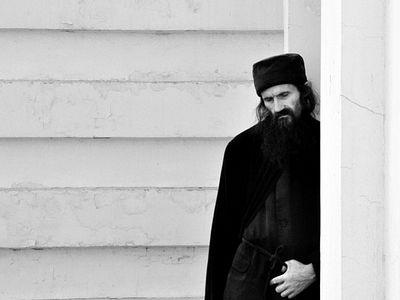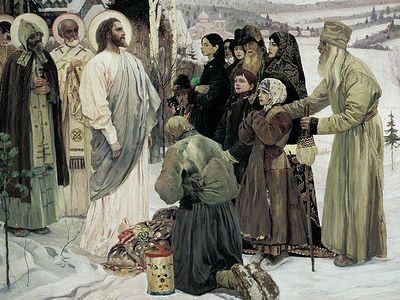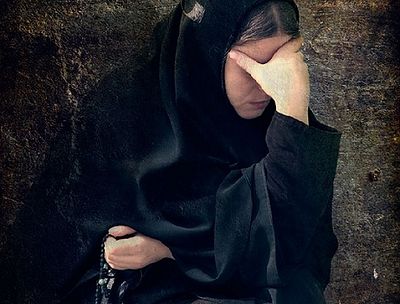Monastic life makes for us two points about the spiritual life.
First, we need to be members of a community of faith. In his Holy Rule, St Benedict says “there are four kinds of monks.” First are Cenobites, “the most steadfast kind of monks,” who “live in a monastery serving under a Rule and an Abbot.” Second are Anchorites, or “hermits” who “after long probation in the monastery” engage in “singlehanded combat … against the weaknesses of the flesh and their own evil thoughts.” It is these two groups of monks, Benedict says, we should admire.
There are two other classes of monks the “most detestable” of which are the Sarabaites or those who have not been formed under a monastic rule and an abbot in a community. As a result instead of being like gold purified in the furnace of the monastic community, they are soft lead who “by their works showing loyalty … to the world” and whose monastic “tonsure profess their infidelity to God.” But even these detestable monks can feel the pull of community life. While some live “alone without a master” others live “in twos or threes” even if the do “shut up in the sheepfolds of their own choosing, not in those of the Lord.” For these the monastery is not a school for charity but rather only a way to serve “the gratification of their desires” doing only what “they consider agreeable to their own will and fancy, this they call holy, and whatever is not to their choice they consider unlawful.”
Finally, there are Vagabonds or those monks who
…spend all their lives wandering about through different provinces, dwelling three or four days now in one monastery then in another, always roaming about with no fixed abode, given up to their own pleasures and to the excesses of gluttony, and in all things more vicious even than the Sarabaites; of the most wretched manner of life of all these it is better to be silent than to speak (Chapter 1).
Life in community, even for those called to be hermits, is the monastic ideal in both the West and the East. Community life is built not simply on “obedience … to the Abbot” but of the monks to each other. And so Benedict says, “let the brethren likewise obey one another knowing that by this path of obedience they shall go to God.” All the monks should give “precedence … to the commands of the Abbot or of the superiors appointed by him” while “the younger brethren” are to “obey their seniors with all charity and solicitude.”
The disobedient are to “be rebuked.” But better still if any monk “perceives that any superior is angered or disturbed by him, however little, let him immediately and without delay cast himself on the ground at his feet and there continue in that posture of penance until the superior is appeased and gives his blessing.” As for those who simply won’t be obedient “let him be expelled from the monastery” (Chapter 71).
The mutuality of obedience is not merely a functional matter. It reflects the sovereignty of God in the life of both the monastery and the monk. While for “matters of less importance concerning the good of the monastery” it is sufficient for the Abbot to “take counsel with the seniors only, as it is written” whenever “anything of importance is to be done in the monastery, let the Abbot assemble the whole community” to discuss and debate what the matter. Each monk should offer his opinion in humility and not “presume to maintain pertinaciously his own opinion.” While the monks are to “submit” to the Abbot’s decision, the Abbot for his part is obligated “to administer all things wisely and justly. … “do[ing] all things with the fear of God and in the observance of the Rule, since he must know without doubt that he must render to God, the most just Judge, an account of all his decisions.”
Though he mentions it almost in passing, Benedict is clear that the discernment of God’s will for the monastery is the shared by the whole community. In this process it is the Abbot’s unique responsibility not simply to make the final decision but to be certain that all the monks offer their views on the matter. Why all the monks? Because “it is often to the younger that the Lord reveals what is better” (Chapter 3).
This highlights the second important point of our spiritual life.
While community, and so tradition, are essential to the spiritual life, so too is the uniqueness of the person.The obedience that is foundational to our spiritual life is always mutual. Such mutual obedience makes room for ALL the members to make a contribution according to the talents and gifts given to them personally by God. The sign of true obedience is that we listen to each other freely and not just begrudgingly.
Turning from the monastery to our everyday life, real obedience is concerned with hearing the voice of God in the voice of our family members, fellow parishioners, brother clergy and even in those of good will with whom we share only a common humanity. In all cases, obedience must be in conformity with Holy Tradition. When obedience in this deeper sense is absence, community life is impossible. Without obedience there is no real community life. And without community life, we are left with a social life characterized by indifference or even open hostility and malice to others.
In Christ,
+Fr Gregory




